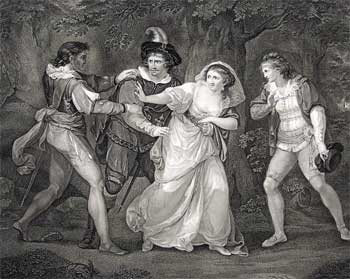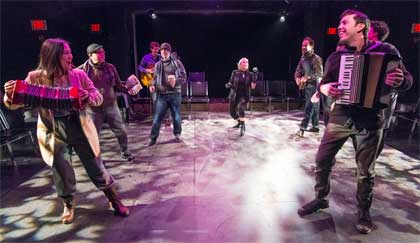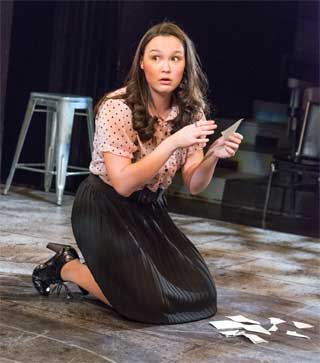Play (1591)
by William Shakespeare
Directed by Robert Walsh
Actors’ Shakespeare Project
Davis Square Theatre
Somerville, MA
December 12, 2012 – January 6, 2013
Scenic Designer: Stephanie Cohen, Costume Designer: Miranda Kau Giurleo, Lighting Designer: Karen Perlow, Bill Barclay: Music Director, Composers: Bill Barclay and Max Kennedy, Choreographer: Susan Dibble, Vocal Coach: Celena Sky April, Stage Manager: Adele Nadine Traub, Production Manager: Deb Sullivan
With Max Kennedy (Musician), Bill Barclay (Proteus), Jaime Carrillo (Valentine), Thomas Derrah (Speed, Antonio, Outlaw), Paige Clark (Julia), Marya Lowry (Lucetta, Duchess, Hostess in Milan), Michael Patrick Kane (Panthino, Thurio, Outlaw, Eglamour), Miranda Craigwell (Siliva), John Kuntz (Launce, Outlaw)

Richard Yates as Launce
in “Two Gentlemen of Verona” (1762)
Proteus loves Julia, who is in Verona, and Valentine loves Silvia, who is in Milan. With pressure from his father, Proteus must go off to join Valentine at the court in Milan, but, before he leaves, he pledges his love to Julia, sealed with rings going both ways.
In Milan, Silvia is under pressure from her mother to give up Valentine and take up with Thurio. Upon arriving there, Proteus catches sight of Silvia and develops a mad crush on her despite his betrothal to Julia back in Verona. Deviously, Proteus offers his assistance to Silvia’s mother in dispensing with his good friend Valentine to presumably help Thurio make his case with Silvia, while really intending to make good on Valentine’s absence to get in with Silvia himself.
Meanwhile, Julia, back in Verona, is getting frustrated without Proteus and disguises herself as a young man and makes her way to Milan, where, in disguise as Sebastian, she enlists as Proteus’ aide. Part of her job becomes helping Proteus win the affections of Silvia – ouch!
But Silvia, a noble woman pledged to Valentine, will have none of Proteus, and, after some difficult revelations, things manage to work out quite well for everyone.
This play is so well written in many ways (I would argue this against the conventional wisdom) and this production is so well directed and acted that the whole thing is a rich pleasure from beginning to end.
Robert Walsh, the director, has put together an incredibly lively show that is filled with music, movement, humor and beautifully articulated Shakespearean speech. And the production’s evocation of character in this humorous, though poignantly rewarding, moral tale is most effectively conceived.
Though written very early in Shakespeare’s career, and often regarded as his first play and not generally as his strongest, I happen to find it beautifully conceived and much of the writing beautifully done.

from “Two Gentlemen of Verona” (1852)
However, if one were counting, one might note some weaknesses in the narrative here and there.
Though Proteus reflects somewhat on the matter of betraying his lover, Julia, and his good friend, Valentine, it is much more quickly conceived and dispensed than one would hope. Even though this is comedy, it is more subtle than farce, and, in more mature comic works, Shakespeare would give more dimension to such soul searching.
Equally, Silvia resists Proteus’ protestations of love with a bit too much uniform conviction and success, and Julia accepts him back a bit too quickly and too easily, leading to a resolution that is shorter and less nuanced than it might be.
So, though this is not a perfectly delineated moral tale, it offers the complications for making an interesting and believable dilemma, and provides some of the basic mechanisms of character for resolving the issues.
Somehow, though an early comedy, it does not feel spoofy in the way, as, for example, does The Comedy of Errors (1594) or The Merry Wives of Windsor (1598). There, the comedy really derives from farce. Here, the humor derives from something more vulnerable and emotive, anticipating later great comedies like Twelfth Night (1601).

from “Two Gentlemen of Verona”
Paige Clark, Thomas Derrah, Max Kennedy
John Kuntz, Marya Lowry, Michael Patrick Kane
Miranda Craigwell, Bill Barclay
© 2012 Stratton McCrady Photography
Courtesy Actors’ Shakespeare Project
The cast members play multiple roles, but it is done in a comprehensible way.
Bill Barclay (Proteus) is exceptionally good in the leading male role, bringing out the sincerity of passion for both Julia and Silvia while giving a plausible enough account – despite the noted limitations in the play – of the machinations of conscience that impede his impulsive actions.
Paige Clark (Julia) is wonderful in the combined role of spurned lover and disguised page. She is enthusiastically passionate and intelligently devious when each is necessary, and though, in the resolution, Shakespeare does not give her quite enough time to teach Proteus a lesson, Clark does an exceedingly estimable job of conveying a faithful love that survives the traumas of emotional infidelity.

in “Two Gentlemen of Verona”
© 2012 Stratton McCrady Photography
Courtesy Actors’ Shakespeare Project
Miranda Craigwell (Silvia) has a fabulously graceful and dignified presence onstage and conveys Silvia’s generous character most convincingly.
It is a special treat to see two of Boston’s most talented theatrical clowns in this production together.
Thomas Derrah, a versatile actor who was a founding member of the American Repertory Theatre and a part of its company for decades, is doing his first run with the Actors’ Shakespeare Project in a variety of comedic roles. John Kuntz, who has done greatly entertaining work with this company for many years is back again, and this time doing his thing with a bulldog in tow. Both he and Derrah are fabulous and funny and it is a unique treat to see them together here.
The other members of the cast – Jaime Carillo (Valentine), Michael Patrick Kane (Thurio) and Marya Lowry (Lucetta and the Duchess) are also great. Carillo is an earnest and dutiful lover to Silvia. And, as the Duchess, Silvia’s mother, Lowry wears a sleek black suit, moves with charismatic slinkiness, and speaks with graceful authority. Kane, as her stooge, Thurio, is hilarious in an understated way, making for great laughs with just a twinkle of the eye or twitch of the head.
The music is beautifully conceived and executed.
Max Kennedy, a young guitarist, sits onstage, playing his own compositions throughout. They are fun, lively and distinctive, and Kennedy plays with authority and theatrical sensitivity. On occasion, when Bill Barclay has a moment to pause from his role as Proteus, he joins Kennedy in some of the music making.
At the very end, Kennedy leads the troupe in a rousing Italian song; it blew the roof off the intimate Davis Square Theatre.
This is a top-notch production, and one of the best of a Shakespearean comedy I have seen by the Actors’ Shakespeare Project, or elsewhere.
– BADMan
Leave a Reply